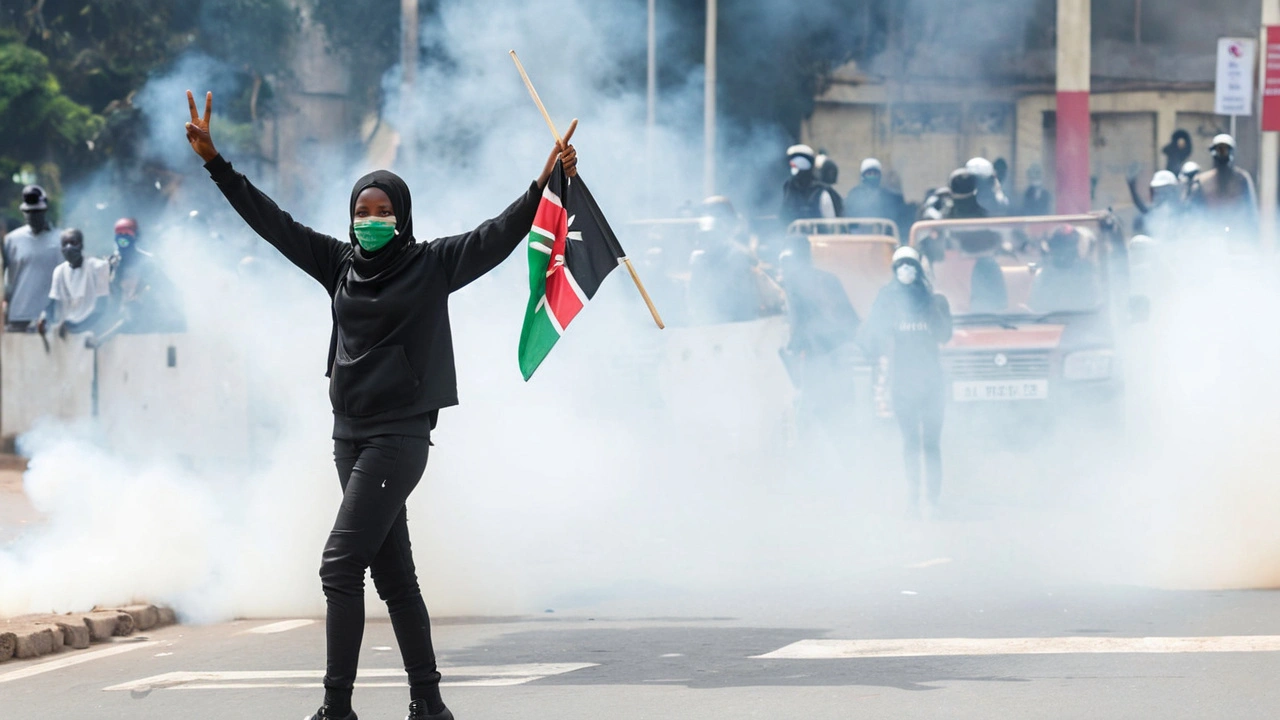Ford Foundation Denies Funding Kenyan Anti-Government Protests Amid Ruto's Accusations
The Ford Foundation has come forward to firmly deny the accusations made by Kenyan President William Ruto about its alleged involvement in financing ongoing anti-government protests in Kenya. This declaration from the foundation arrives amidst a backdrop of rising tensions and escalating demonstrations that initially sparked due to proposed tax hikes but have now grown into a much wider movement against Ruto's administration and its policies.
President Ruto recently sensationalized this issue by attributing the funding of the protests to the Ford Foundation, a claim that has not only grabbed international attention but also intensified the discourse within the republic. According to Ruto, the Foundation has been fostering 'turmoil' by financially backing these anti-government movements, leading to clashes and numerous casualties. These protests, which have shaken the nation, are seen by many as a manifestation of growing discontent towards the current administration’s handling of the economy and governance.
History and Mission of the Ford Foundation
Founded in 1936, the Ford Foundation is an American private foundation with a global mission to promote social justice, reduce poverty, and advance democratic values. For several decades, it has extended its financial support to various civil society groups and rights organizations across Kenya. These organizations endeavor to uplift disadvantaged communities, champion human rights, and bolster democratic frameworks within the nation.
The Foundation's intrinsic goal of fostering equitable societies is well-documented, and it carries out its objectives through non-partisan and unbiased grant-making. This is a cornerstone of its ethos, and it’s a principle it firmly stands by amid the recent allegations. The foundation asserts that its granting procedures and the support provided aims at addressing systemic issues without taking sides in political affairs.
Immediate Responses and Official Stances
Despite the gravity of the allegations, both the Ford Foundation’s Africa office located in Nairobi and the US embassy have practiced restraint, declining immediate comments initially. However, a comprehensive statement was subsequently released, in which the Ford Foundation categorically denied the claims of financing the anti-government protests. It underscored its non-partisan stance and re-emphasized its commitment to peace and social justice, condemning any incitement to violence or political unrest.
In their response, the Foundation also highlighted the transparent nature of its grant-making processes—ensuring that all funds are systematically tracked and employed exclusively for their intended developmental purposes. This transparency, they argue, nullifies any grounds for the claims made against them.
Analysts' Perspectives on the Allegations
Political analysts and experts have weighed in on the issue, with many viewing Ruto’s allegations as attempts to scapegoat external entities for internal struggles. Some analysts suggest that these accusations could be part of a broader strategy by the President to distract public attention from the pressing economic and social challenges Kenya faces. In this light, Ruto’s remarks might be seen as efforts to retain political control and shift the narrative away from the growing dissatisfaction within his governance.
This tactic of blaming foreign organizations isn’t unprecedented, and historically, the finger has often been pointed at international bodies or nations to explain domestic turbulence. By alleging external interference, leaders sometimes seek to unify their base and galvanize support against perceived common adversaries.
Context of the Ongoing Protests
The protests in Kenya have roots in economic discontent, initially sparked by propositions for tax increases that many Kenyans saw as burdensome. What began as organized objections to these economic policies soon evolved into wider protests addressing grievances about unemployment, corruption, and the efficacy of the government. The manifestation of public discontent in the form of protests isn't novel but reflects a growing trend of amplified civic engagement and demand for accountability.
Casualties reported during the protests have added further weight to the situation, intensifying calls for government redress and reform. The demonstrators, encompassing a cross-section of society, seem to look towards a collective voice to bring about substantial changes in the governmental approach and leadership of the country.
The Role of Civil Society in Kenya
National civil society organizations in Kenya, many of which have received funding from the Ford Foundation over the years, play a pivotal role in advocating for human rights, democratic governance, and social equity. They serve as watchdogs, holding the government accountable, and amplifying the voices of marginalized and vulnerable communities.
By funding these groups, the Ford Foundation aims to strengthen the civic landscape and promote meaningful dialogue between governmental entities and citizens. This fosters environments where grievances can be addressed through structured, peaceful, and democratic means rather than violence and turmoil. The Foundation’s support helps fortify frameworks that are essential for the nourishment of democracy and civic participation.
Global Implications and Local Reactions
The accusations against an internationally recognized entity like the Ford Foundation not only generate local repercussions but also resonate globally, reflecting on Kenya's position on the world stage. The broader implication of such allegations can affect partnerships, funding opportunities, and international relations, potentially hampering developmental progress in the nation.
Locally, the Ford Foundation remains a respected pillar within Kenya’s civil society sphere. Despite the allegations, many community leaders and organizations continue to vouch for the positive impacts derived from the Foundation's support. They argue that attributing the unrest to the Ford Foundation trivializes the legitimate concerns and aspirations of Kenyans advocating for their rights and better governance.
The Path Forward
As the situation continues to unfold, it remains imperative for both the government and civil society to engage in constructive dialogue. Addressing the core issues raised by the protestors transparently can potentially quell tensions and pave the way for reconciliatory measures that strengthen national unity. Mutual understanding and cooperation between governmental bodies and civil society organizations can create a fertile ground for sustainable solutions to emerge.
In closing, while accusations continue to swirl, the need for empathetic governance and active civic participation stands clear. The Ford Foundation's stance reiterates the importance of preserving democratic norms and fostering environments where social justice can thrive unimpeded by political strife. Only through unity, understanding, and robust dialogue can Kenya hope to navigate these turbulent times and emerge stronger.







Jasmine Hinds
Wow what a tangled mess in Kenya!! 🚀 The news about Ford being blamed is wild 🚀 the government loves a good scapegoat 😅 keep the facts coming 🙌
Madison Neal
From a policy analysis perspective the attribution of external grant-making to protest financing lacks empirical substantiation and conflates civil society capacity building with insurgent financing mechanisms. The discourse is saturated with buzzwords like “social justice” and “democratic resilience” that obscure the underlying macroeconomic grievances driving the street mobilizations. Moreover, the operational transparency protocols cited by the Foundation align with standard fiduciary compliance frameworks observed across multilateral funding bodies. It’s essential to differentiate between facilitative grant structures and direct cash flow to protest logistics. The narrative framing by the administration appears strategically oriented toward delegitimizing dissent.
John Crulz
I see both sides and I think the Kenyan government is feeling the heat from a soaring cost‑of‑living crisis. At the same time, external NGOs have a long history of supporting grassroots empowerment without taking a partisan stance. It’s a delicate balance between legitimate civil society activism and perceived foreign interference. The president’s rhetoric may be a political tactic to rally his base, but it also risks alienating valuable development partners. Dialogue and transparency could defuse the tension.
Anita Drake
The community perspective often gets lost when headlines focus on blame games. Many local NGOs have relied on foundation grants to run health clinics, education programs, and voter education campaigns. These efforts are rooted in local needs, not foreign agendas. Acknowledging that reality can help rebuild trust between citizens and the state.
Eduardo Lopez
The so‑called “foreign puppet masters” are nothing but a myth fed to distract from the president’s fiscal failures.
Nancy Perez de Lezama
It is noteworthy that the Ford Foundation’s financial reports are publicly accessible and detail each grant allocation. Such transparency disputes any covert funding allegations. While the government’s security concerns are valid, painting all NGOs as conspirators is an overreach. A more nuanced approach would serve the nation better.
Matt Heitz
The narrative that an American foundation is stoking unrest is a classic example of externalizing internal policy failures. By invoking foreign interference, the administration sidesteps accountability for tax policy missteps and corruption. This rhetoric feeds nationalist sentiment and inflames division. It also undermines legitimate civil society work that has been instrumental in advancing human rights. The donor community should remain vigilant but not be scapegoated for every protest. Ultimately, sustainable solutions require domestic reform, not blame‑shifting.
Susan Mark
From a practical standpoint, many community groups rely on those grants to deliver clean water projects and youth training. When the conversation turns to conspiracy, the real beneficiaries-Kenyan citizens-lose focus. It’s important to keep the discussion grounded in tangible outcomes rather than speculation. Supporting evidence‑based policies will benefit everyone.
Jason Jennings
Honestly the whole thing smells like a political stunt to keep the opposition silent. If the president can point a finger at a foreign charity, he avoids answering why people are angry about taxes. It’s cheap politics, plain and simple.
Diego Vargas
i think the fundin guidence of ford is public and i can see the repts on their website. they not giving money direct to protests they just support groups that help communties. also, the govnt should fix the ekonomic issue not blame outsidrs. kinda obvious.
Alex Lee
This accusation is baseless.
Vida Yamini
It is absolutely understandable that the situation feels overwhelming and that many citizens are searching for explanations that make sense In the midst of soaring taxes and rising living costs the instinct to look for an external culprit is human It is also true that the Ford Foundation has a long history of funding projects that aim to strengthen civil society Yet the link between those grants and the organization of street protests is not clearly established The financial reports released by the foundation show a systematic allocation of funds to registered NGOs and no direct cash flow to protest organizers Moreover the foundation emphasizes non‑partisanship as a core value and has policies that prevent funds from being used for political campaigning While the government’s concerns about foreign influence are not without precedent the evidence presented so far does not substantiate a covert funding operation The narrative that paints the foundation as a puppet master can inadvertently undermine the valuable work of grassroots groups that rely on transparent funding The Kenyan media could benefit from a more nuanced analysis that distinguishes between legitimate civil society advocacy and illicit political financing The public deserves clarity and factual reporting rather than emotionally charged accusations The president’s statements may resonate with supporters who feel threatened by change but they also risk alienating international partners who have contributed to development goals The path forward should include an independent audit of all grant disbursements and a public forum where NGOs can explain their activities The conversation should shift from blame to constructive dialogue that addresses the core economic grievances The ultimate goal is to build a resilient society where both the government and civil actors collaborate for the common good The hope is that reason and evidence will prevail over sensationalism
James Lawyer
The legal framework governing foreign aid in Kenya requires registration and compliance with the Foreign Contributions (Regulation) Act, which provides a statutory basis for oversight. An independent investigation aligned with this legislation would reinforce public confidence. It would also clarify whether any procedural breaches have occurred. Such a process should be transparent and include stakeholder participation to ensure legitimacy.
Abby Culbertson
i feel sad seeing all the drama it just makes everything worse.